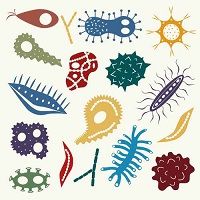Promising Drug for C. difficile Infection Prevention
A drug that shows promise in protecting the human gut microbiome from antiobiotic assaults that can lead to C. difficile infection is about to enter Phase 2 trials. So far, it has worked well in lab pigs, researchers said at Digestive Disease Week 2015.

Though fecal microbiota transplant is showing it can cure C. difficile infection, researchers are also looking at ways to prevent it.
In an abstract presented May 19 at the Digestive Disease Week 2015 conference in Washington, DC, researchers from the Tufts Cummings School of Veterinary Medicine in North Grafton, MA, reported on a clinical-stage oral beta-lactamase therapy.
Known as Syn-004, the drug candidate is designed to protect the gut microbiome from being destroyed by intravenous antibiotics.
So far it has been successfully tested in healthy human participants in Phase 1 trials. Manufacturer Synthetic Biologics expects to complete Phase 2 trials this year.
The product works by inactivating a broad range of cephalosporins once they have reached the gut. That includes ceftriaxone, Sheila Connelly of Synthetic Biologics and colleagues at the veterinary school wrote in the study. The researchers introduced human adult fecal microflora in to gnotobiotic baby pigs and put them on ceftriaxone for 4 days. Pigs that also got Syn-004 maintained the healthy microflora while controls did not.
“These data demonstrate that Syn-004 has the potential to protect the human microbiome and to become the first prophylactic therapy designed to prevent antibiotic-mediated microbiome damage, including C. difficile infection,” the team concluded.
According to the company, there are 1.1 million C. diff infections and 30,000 related deaths annually in the US. If the drug continues to prove its merits, the market would be huge. There are 118 million doses of intravenous beta-lactam antibiotics given annually to US hospital patients and the company expects those antibiotics could be inactivated in the gastro-intestinal tract by Syn-004. The company is based in Rockville, MD, and is also working on an oral statin treatment to reduce the impact of methane producing organisms on constipation-predominant irritable bowel syndrome, among other projects.